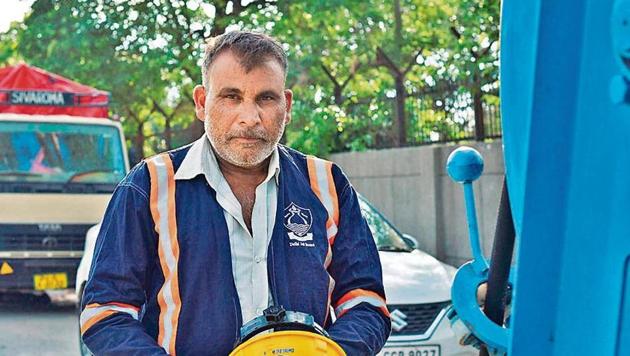Manual scavengers struggle to start afresh despite rehab
In 2018, the government, for the first time, acknowledged the presence of manual scavengers in the national capital and identified 32 of them in east and northeast districts.
Last year, Rocky (28) (who goes by one name) decided to start his life afresh and promised never to enter the sewer again. He was part of the first, and the only, batch of manual scavengers who were trained in housekeeping work as part of a rehabilitation initiative backed by the Delhi government .

Rocky got a caretaker’s job at a night shelter in Sanjay Amar colony, Shahdara, east Delhi. But he has not been able to keep the promise he made to himself. “I still enter and clean sewers. I don’t like doing this but I have no option. I have to take care of my family,” Rocky said as he showed the certificate he got after the three-month training and the job offer letter.
“Though we were promised Rs14,000 per month, I don’t get my salary every month. They paid me in instalments and my salary is still pending for the past few months.”
In 2018, the government, for the first time, acknowledged the presence of manual scavengers in the national capital and identified 32 of them in east and northeast districts.
The training was conducted by Sadik Masih Medical Social Servent Society (SMMSSS) — a Delhi-based NGO working for poor people — with assistance from the Delhi government.
The training was part of the rehabilitation process mandated under the Prohibition of Employment as Manual Scavengers and their Rehabilitation Act, 2013.
The Act was passed following demands to end manual scavenging and recommendations of the National Advisory Council to the Centre in 2011 to take steps to eradicate the practice and prohibit the employment of manual scavengers.
Vinay K Stephen, chief functionary of SMMSSS, said most of the people from the batch of 63 people, including 28 manual scavengers, got jobs. “We absorbed at least 27-28 people. The remaining we got placed in schools, hospitals and private firms in housekeeping jobs. We don’t know how many are still working. We had employed people in our night shelters. But about 16 decided to work with Delhi Jal Board contractors on the new machines as they are getting more money. 11 people are still working with us in the night shelters,” said Stephen.
Stephen’s organisations runs some of the government-owned shelter homes in Delhi.
The trainees differ. The three-month training, Nitin Kumar, another manual scavenger, says, was a “waste of time”.
Nitin (25) says he left his job, which he got after the training, at a night shelter in Kabool Nagar in Shahdara as he didn’t get salary on time.
“We wasted 6-7 months in training and working. As we didn’t get salary on time, I had to take loans from family and friends,” said Nitin, who now works as a labourer, cleaning sewers with the new machines procured by the DJB and given to families of manual scavengers.
Rishi Pal (50), trainee, too left his job at the night shelter and joined the group of DJB workers. Both Pal and Nitin say they stopped entering the sewer now. “This is the only change in my life. Now I clean the sewer wearing protective gear,” said Pal.
Vishnu (35) says he didn’t get a job after the training and has been manually cleaning sewers to take care of his family.
Stephen refuted the claims. “There was a delay in paying salaries, as we didn’t get funds from the government due to elections. We recently got payments cleared from the government and have paid people. A large number of them have been paid salaries till May. All balance payments will be made at the earliest. I even got some of them placed in DJB on a contract basis.
“As an NGO. we have been trying to help them. But they want a job near their homes. It is not possible...To rehabilitate them, the government will have to proactively work and rope in corporates,” said Stephen.
Social welfare minister Rajendra Pal Gautam said the matter was recently brought to his notice.
“I raised the issue with the urban development minister regarding non-payment of salaries. I have requested him to look into the matter and take strict action against the NGO if the salaries have not been paid on time. It was our government that for the first time identified 32 manual scavengers and planned for their rehabilitation.”
The government is yet to compile a report on the exact number of manual scavengers in the city. “I have written to all district magistrates to submit a report to me in this regard at the earliest,” said Gautam.



